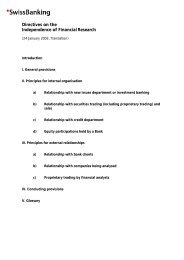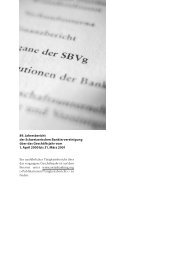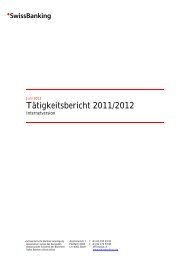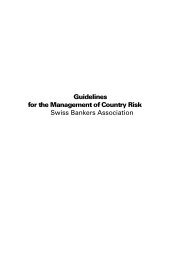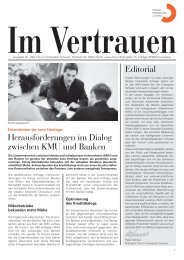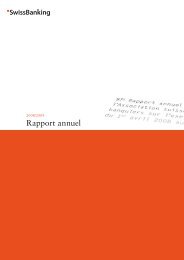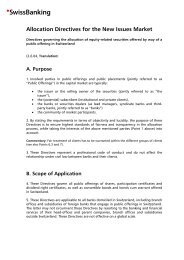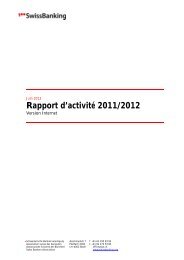Annual Report
Annual Report
Annual Report
- No tags were found...
Create successful ePaper yourself
Turn your PDF publications into a flip-book with our unique Google optimized e-Paper software.
<strong>Annual</strong> <strong>Report</strong>
The Swiss Bankers AssociationThe Swiss Bankers Association isthe leading organisation of theSwiss financial centre and– represents the interests of thebanks and securities dealers vis-àvisthe authorities in Switzerlandand abroad;– promotes Switzerland’s image asa financial centre throughout theworld;– fosters open dialogue with a criticalpublic in Switzerland and worldwide;– develops the system of self-regulationin consultation with regulatorybodies;– supports the training of juniorstaff and established executives inthe banking industry;– facilitates the exchange of informationand knowledge betweenbanks and bank employees;– coordinates joint projects undertakenby the Swiss banks.➞
The Swiss Bankers Association(SBA) was founded in 1912 in Baseland today has a membership of364 institutions and approximately9,300 individual members. The Association’sOffice employs a staff ofover 50. A total of 13 commissionsdeal with key issues affecting theindustry. Serving on these commissionsare representatives of variousbanking groups as well as specialistsfrom the SBA. The SBA’s mainobjective is to safeguard and promotean optimal environment forthe Swiss financial services industryat home and abroad.Pierre Mirabaud, Senior Partner atMirabaud & Cie, Geneva, has beenChairman of the SBA’s Board ofDirectors since 2003. Urs P. Rothhas been Chief Executive Officersince March 2001.
92nd <strong>Annual</strong> <strong>Report</strong> of theSwiss Bankers Associationfor the year1April 2003 to 31 March 2004A detailed report of the year’s activitiesis available in German and French on thewebsite www.swissbanking.org under“Publications/Activity <strong>Report</strong>”.1
Contents4 Chairman’s ForewordCurrent Issues8 The communication policyof the Swiss Bankers Association –long-term and focussed12 University-level education – a keysuccess factor for Swiss Banking16 Framework conditions forSwitzerland’s financial centre –interest rates20 Issue management – more thanjust the early identification ofrelevant themes24 <strong>Report</strong>s from theCommissions30 Areas of responsibility withinthe Office/Contact addresses32 Association Business34 Accounts38 Organs of the Swiss BankersAssociation40 Bank Institutions42 Utility InfrastructureProviders, Associationsand Federations48 Imprint3
Chairman’s ForewordLadies and Gentlemen,When I was appointed the new Chairmanof the Swiss Bankers Association a yearago, I identified privacy, regulation, educationand communication as the keyissues for the start of my term of office.A year on seems to me the perfect timefor an initial review.Education refers to thetechnical know-how ofour banking staff. I seeparticular potential forqualitative improvementat university level, and weintend to make advances Pierre G. Mirabaudin this area through our“Polyfinance” initiative. This annual reportcontains a number of additionalcomments on this topic together with informationon the current status of theproject and other SBA education initiatives.In my first speech to the media, Isaid that communication with all dialoguegroups was vitally important andrepresented a key aspect of my work. Atthe time I had no inkling just how truethis statement would turn out to be, particularlywith regard to its timing. In ourmany visits to the decision-makers inBern, Brussels, Berlin, Paris, Londonand Washington, we strove to representthe interests of Switzerland’s financialcentre. In countless interviews with mediarepresentatives, I explained the importanceof the financial sector for theprosperity of our country. Furthermore,I experienced the true diversity of SwissBanking in numerous discussions withsenior bank staff throughout Switzerland.In the chapter entitled “On targetthrough strategic communication” weset out our communication philosophy.4
Bilateral Agreements II – bank-clientconfidentiality is preserved in its entiretyOver two years of intensive wranglingbetween Switzerland and the EU overthe Bilateral Agreements II culminatedin a positive result for Switzerland andits financial centre. In particular, privacy– or more specifically bank-client confidentiality– was preserved for the vitalarea of direct taxation in respect of thethree key issues for Switzerland’s financialcentre, namely the taxation of interestincome, fraud and Schengen/Dublin.Our persistent Swiss diplomats deserveimmense praise for achieving success inwhat was undoubtedly a difficult task.Does this mean, then, that Switzerlandhas once again cherry picked the best elementsof the deal at the EU’s expense?Certainly not! Rather, Switzerland hasdefended its interests in a manner altogetherfitting for a sovereign state. Andit goes without saying that as part ofthis process the interests of by far themost important pillar of our economy –the financial sector – hadThe EU has for the very first to be given priority consideration.Other coun-time signed a treaty formallyrecognising Swiss bank-client tries follow exactly theconfidentiality with regard to same approach. Becausethe taxation of interest of this, the three agreementsrepresent a bal-income and Schengen/Dublinover the long term.anced result. With regardto the taxation of interestincome, the EU receives tax revenues atno expense to itself. This is somethingquite unique – a state has never beforecollected taxes for another state. Whatis more, Swiss banks are picking up thetab of several hundred million francs forthe implementation of the required systemswithout grumbling. The EU’s demandsin respect of fraud have alsolargely been met. Switzerland will providethe EU with judicial and administrativeassistance for serious offences relatingto indirect taxation, therebyextending the long-standing domesticSwiss practice to other countries as well.The fact that this change also closes agap in the Swiss legal system that hasbeen detrimental to the reputation ofSwitzerland’s financial centre for someconsiderable time also merits mention inpassing.Switzerland can be more than satisfiedwith the outcome of the second round ofbilateral negotiations. Thanks to Schengen/Dublinwe have finally establishedthe basis for more intensive cooperationin the area of security and asylum policy,a vital task in today’s uncertain world.The Swiss banks as well as their domesticand international clients can alsobreathe a sigh of relief, as the EU hasfor the very first time signed a treatyformally recognising Swiss bank-clientconfidentiality with regard to the taxationof interest income and Schengen/Dublin over the long term. The treatyplaces bank-client confidentiality on aneven more solid international footingthan before Schengen/Dublin. Interna-5
tional pressure on Switzerland’s financialcentre should now ease off, andthis is likely to foster renewed faith inSwitzerland’s stability and legal securityamong foreign clients, whose confidencemay have been somewhat shaken overrecent years as a result of the repeatedverbal attacks from the EU.The evaluation of these key agreementsis unfortunately characterised onceagain by typical Swiss nitpicking. Ratherthan rejoicing at the overwhelminglypositive aspects, certain circles prefer topick out and overdramatise isolatedpoints for purely polemical purposes.We could do with rather more civicmindedbehaviour and rather less votechasingarithmetic. ThisRegulation has to meet costbenefitrequirements and solid, sustainable solu-is the only way to ensurecannot be allowed to drive tions for our country.structural policy.Swiss banks are and alwayshave been aware oftheir responsibilities – their willingnessto collect the so-called paying-agent taxis a prime example of this. Swiss bankswholeheartedly support the BilateralAgreements II, therefore; the results arefair to all parties concerned, the concessionsmade are acceptable and bankclientconfidentiality has been secured inits entirety for the long term.Integrated financial market supervision:yes, but it must be coordinatedThe banks also tackled a veritable raftof regulatory projects in the year underreview. It is for this reason that we havebeen sounding the alarm bells for sometime and making it clear that nothingless than the international competitivenessof our industry is at stake. The cruxof our criticism is all too familiar. Regulationhas to meet cost-benefit requirementsand cannot be allowed to drivestructural policy. We have also examinedthe planned integration of financialmarket supervision (FINMA) from theseperspectives, and have concluded thatthe project should broadly be supported.FINMA’s modular structure appearssensible, but we will fight to ensure thatthe project is implemented in a way thatensures a level playing field for allproviders. Perceived risks can only beminimised in an effective and crediblemanner if all market participants enjoythe same level of market access and playby the same rules, and this in turn playsa key role in safeguarding the good reputationof Switzerland’s financial centre.Care must also be taken to ensure thatthe various federal regulatory projectsare closely coordinated in terms of timingand content in order to create aneffective whole. This is especially true asregards the coordination of financialmarket legislation and the Federal BankingCommission’s planned market abuseregulations. To sum up, we recommendthat a transparent analysis of the relativecosts and benefits of FINMA be carriedout before any additional regulationsare introduced.Allocation directives for the new issuesmarket – self-regulation delivers goodresultsWe consistently issue practice-orientedyet highly effective self-regulatory directives,repeatedly proving that we are notrigidly opposed to any form of regulation.The most recent examples of thiswere the allocation directives for thenew issues market, which were promulgatedin June 2004. The aim of the directivesis to improve the fairness andtransparency of the allocation processfor both the primary market(IPOs) and capital increases.The directives ap-requirements relating to theThe prime focus is onply to all public issues objectivity and transparencyof the allocation process.and placements of shares,participation certificates The directives define rulesand dividend-right certifi- of conduct for this.6
cates as well as convertible and warrantbonds in Switzerland. Their prime focusis on requirements relating to the objectivityand transparency of the allocationprocess. The directives define rules ofconduct for the allocation process. Theycontinue to allow for differences in thetreatment of individual clients or clientgroups in line with the need to balancethe relative claims of parties involved.Allocations based on promises of specialreciprocal compensation are explicitlyforbidden. Furthermore, issue prospectusesmust in future include additionalinformation on any greenshoe options.Transparency is also required in respectof specific allocations requested by theissuer, for example to business partnersor even employees. Finally, nostro allocationsby the underwriting banks – particularlyfor market-making purposes –are only permitted by arrangement withthe issuer and on an appropriate scale.Once the transaction has been completed,the lead bank must disclose theplacement volume together with the sizeof allocations to any subscriber categorieshaving special connections to theissuer as well as any greenshoe optionsexercised. The new rules have beenaccepted by the Federal Banking Commissionas a binding supervisory minimalstandard and will enter into forceon 1 January 2005.As you can see, there has been no shortageof challenges over the past year. Iwould like to thank everyone who iscommitted to defending the interests ofSwitzerland’s financial centre, and canassure you that I will approach the secondyear of my term of office with justas much enthusiasm and commitment asthe first.Pierre G. MirabaudChairman7
The communication policyof the Swiss Bankers Association –long-term and focussed“Half of all communication measures miss their target,” an American industrialistreportedly once said.“But we don’t know which half,” he added.TheSwiss Bankers Association (SBA) certainly works with much less wastage asregards communication. In recent years, it has focussed its activities on thekey action areas and target groups for Switzerland’s international financialcentre and operates within the parameters of a clearly defined concept.Communication in the broadest sense isundoubtedly one of an association’s coretasks. The demands are extremely exacting,however, particularly for a bankingassociation that represents an industrywith such a firmly anchored and exposedpresence at both national andinternational level. An event here, aspeech there. A letter in a US businessmagazine, a lobbying initiative in a Europeanparliament. The risks are many –that you will waste your energy, becomebogged down in activism or focus on thewrong areas. In order to guard againstthis, communication at the SwissBankers Association is based on a conceptof pursuing long-term, recurringand sustainable dialogue with key targetgroups.Europe at the epicentreof lobbying activitiesIn geographical terms, the SBA’s activitiesare geared to the main markets andpolitical action areas in which the interestsof the financial centre need to berepresented. In the year under review,the main focus was on Europe, primarilyon Germany and the European Union.However, Paris, above all the OECD,and the City of London were also targetsfor delegations of Swiss bankers.For example, the SBA supported the bilateralnegotiations between Switzerlandand the European Union through intensivedialogue in the key centres of Europeandecision-making. The ongoing harmonisationof the SBA’s position withthat of the negotiators from the federal8
government played an important role inthe successful conclusion of the negotiations.We had no major international financialtopics to discuss with the USA last year,with the obvious exception of the globalfight against the financing of terrorism.The cooperation with Switzerlandin this area received fulsome praise fromUS diplomats and senior governmentrepresentatives, and works very well.The USA is and will remain a primefocus. For almost 20 years now, representativesof the Swiss banks have beenwelcome and respected discussion partnersin Washington.The rise of the Asian markets has madethis another increasingly important areafor the Swiss banks, but it is still only aminor priority for our financial centre interms of banking policy. Nevertheless,the SBA is engaged in an ongoing, targeteddrive to establish a network withingovernment circles in this region.Swiss banks are less engaged with thenew Eastern European members ofthe expanded EU, where opportunitiesare taken but not actively sought, forinstance the visit of Polish CentralBank Chairman Leszek Balcerowicz toSwitzerland, for which the SBA hosted aluncheon with 90 guests.Should the financial centre draw worldwideattention to itself by placing fullpageadvertisements in the internationalfinancial press? No – the SwissBankers Association hastaken a conscious decisionnot to adopt this approach.Instead, the SBAbelieves that it is far moreeffective to make directcontact with opinionformers.It is for this reasonPrecisely as a result of themajor social and economicimportance of the financialsector, the SBA addresses asignificantly wider audiencein Switzerland than inan international context.that senior representatives of the SBAmake frequent, regular visits to Berlin,Brussels, Strasbourg, Paris, London andWashington in the company of leadingSwiss bankers. Locally-based lobbyingorganisations prepare the ground, andSwiss diplomats have already openedseveral doors for the bankers.The domestic Swiss market isthe top priority“Travel in Europe – rest in Switzerland!”This legendary slogan of theSwiss Federal Railways could easily doservice as the motto for the communicationactivities of the Swiss Bankers Association,although the SBA by nomeans “rests” in Switzerland. Despitethe Association’s huge commitments onthe international stage, which involve agreat deal of overseas travel, the mainfocus of its activity remains in Switzerland.Precisely as a result of the majorsocial and economic importance of thefinancial sector, the SBA addresses a significantlywider audience in its owncountry than in an international context.Expenditure on activities withinSwitzerland accounts for 60% of thecommunication budget, a correspondinglylarger proportion than is spent oninternational measures.In Switzerland, citizens of voting age area vital constituency for the banks, sinceat the ballot box they can influence theoverall operating environment both tothe benefit and to the detriment of thebanks. The SBA carries out intensivelobbying work in Berne, where thebanks act as a trustedsource of information forpoliticians and administrators.The time whenlobbying was a process ofmutual favours is a thingof the past. The aimnowadays is to make a9
constructive contributionto the opinion-formingprocess and provide expertisewhere requested.To support these activities,in the year underreview the SBA launcheda public affairs campaignto make opinion-formersfrom the fields of politics, administrationand economics as well as the publicat large aware of the immense economicimportance of the banking sector andthe issues that affect it.For a better operating environmentCommunication is not an end in itself; itmust follow defined objectives. At astrategic level, the SBA has identified thefollowing communication goals:– To improve the overall operatingenvironment for the banks both inSwitzerland and abroad.– To gain and increase recognition ofthe integrity and competence ofSwitzerland’s international financialcentre.– To improve the general level ofknowledge about Switzerland’sfinancial centre.In our own country, we must also workto highlight the economic and social importanceof the banking sector and gainrecognition for the performance andcontribution of the financial centre.Outside Switzerland, however, in additionto the strategic objectives we needTo enable it to react quicklyand professionally to breakingevents, the SBA has a“Quick Reaction Team”(QRT) that can prepare andapprove a common positionstatement via electronicmeans in a matter of hours.to tackle prejudices andhelp gain internationalacknowledgement of ourcountry’s sovereign status.Well-organisedopinion-formingMessages and positionstatements are defined in accordancewith these communication rules. TheSBA’s Board of Directors has the finalsay on all strategic statements. The “ExecutiveCommittee International FinancialCentre Switzerland” (LAIF), whichcomprises senior management boardmembers and technical specialists fromthe banks, prepares the topics. TheCommission for Communication andPublic Affairs handles the communicativeassessment and ensures correctimplementation. To enable it to reactquickly and professionally to breakingevents, the SBA has a “Quick ReactionTeam” (QRT) that can prepare and approvea common position statement viaelectronic means in a matter of hours.The interplay between strategic committeesand the QRT is efficient and hasproved to be highly effective in practicalsituations.Intensive media workAlongside lobbying-oriented communicationactivities, dialogue with the mediain Switzerland and in the action areasreferred to above has top priority. A10
standard lobbying campaignin a foreign countryincludes media contactswith the local financialpress and locally-basedSwiss correspondents. TheSwiss outposts in Brusselsare especially important.The opinion of the relationshipbetween Switzerlandand Europe broadcastinto Swiss livingrooms from the power centre of the EUhas a major impact on both media consumersand fellow Swiss journalists andis often adopted here at home.The SBA is one of the key players on theSwiss economic scene, and this is reflectedin its intensive media work: backgrounddiscussions at all levels, mediaconferences, training events, interviews,articles and letters, etc. are all part ofthe Association’s daily business.The Swiss Bankers Association’s PR specialistsare available to the media 24hours a day, seven days a week. As inother areas of our work, our media activitiesare based on transparency, continuityand credibility. In the case oftopics of strategic importance to thefinancial centre – such as the BilateralAgreements II with the EU – the SBA activelymaintains a position of opinionleadership. For less relevant issues, a reactiveresponse is required. Prepared positionstatements can be communicatedeither on request or as and when required,thereby ensuring that credibilityremains intact. The SBA primarily issuesstatements on its core issues, and thesestatements are both dedicated and highlyprofessional.In the case of topics of strategicimportance to the financialcentre, the SBA activelymaintains a position ofopinion leadership. For lessrelevant issues, a reactiveresponse is required. The SBAprimarily issues statements onits core issues, and thesestatements are both dedicatedand highly professional.“PR begins at home”Internal communication,which for the SBA meansdialogue with its some9,300 individual members,is a key element ofany communication concept.“PR begins athome” is an age-old communicationadage. Thecorresponding mandateissued to the SBA’s Secretariatby the Board of Directors is as follows:the SBA’s individual membersmust be made aware of key issues. In recentyears, the SBA’s password-protectedExtranet has developed into a muchusedinternal information tool. A circularis sent out on average every thirdworking day, and the newsletter “kurz& bündig” goes out over the networksix times each year. We are particularlypleased at how the “Swiss Bankers’Club” has developed. Individual membersof the SBA are automatically membersof this club, which aims to promotenetworking and the exchange of opinionswith the Association.The format is simple: luncheon meetingswith an interesting speaker. The range ofspeakers stretches from A for Alderthrough C for Coninx or K for Keckeisand up to Z for Zuberbühler. In the yearunder review, almost 30 such luncheonstook place in Zurich, Basel, Berne, St.Gallen, Geneva and Lugano. These werecomplemented by a handful of extremelypopular evening events such as visitsto the Zurich Opera or Basel Zoo. “Lifeis so hectic nowadays that you no longerget the chance to meet up with colleaguesfrom other banks,” commentedone participant. A total of some 2,000bankers made use of the opportunitiesoffered to them by the Swiss Bankers’Club last year.11
University-level education –a key success factor for Swiss BankingEmployee education is a vital factor inthe competition between internationalfinancial centres.The Swiss BankersAssociation (SBA) is committed to solid,future-oriented training at basic andadvanced level. However, there are deficienciesin banking and finance trainingat university level. Poor cooperation,too little transparency and the absenceof an international dimension makeSwitzerland unattractive as a universitylocation in terms of vocational training,research and executive education.With the “Swiss International Finance/Polyfinance” project, the SBA is launchingan initiative to promote university-leveleducation in Switzerland gearedspecifically to the requirements of thefinancial centre.Financial centres are exposed to increasinglyfierce international competition. Ifthey are to maintain a lead over theirrivals in other countries, they need toconstantly re-evaluate and enhancetheir own competitiveness. Success andthe competitive edge do not come easily.Ultimately, the deciding factor is directcomparative performance, and the educationand training of bank staff formsthe basis for this performance. The Swissfinancial services industrytherefore requires highlyqualifiedstaff at all levels level of coordination wouldWe believe that an increasedand direct access to highqualityknow-how. In a tiveness. Switzerland must ingenerate much greater effec-country which generates future become one of thesome 14% of its economicoutput in the financial banking and finance trainingworld’s leading centres forsector, university-level educationin the field ofat university level.banking and finance clearly plays anespecially crucial role: a first-class financialcentre must also have a top-flighteducation system.12
Deficiencies in the banking and financetraining offered by universitiesAlthough Switzerland in principle alreadyoffers a wide range of bankingand finance courses at university level, itcurrently possesses only the rudimentsof the framework required to achieveeffective recognition and be genuinelycompetitive on an international scale.The fragmented approach, in otherwords the lack of any nationwide movesto bundle resources, leads to far-fromperfectsolutions and an unnecessaryduplication of effort. We believe that anincreased level of coordination wouldgenerate much greater effectiveness.Switzerland must in future become oneof the world’s leading centres for bankingand finance training at universitylevel, and must also become an attractivetraining location for students fromall over the world.“Swiss International Finance/Polyfinance”: an initiative of the SBAThe SBA has declared its intention towork together with interested parties inthe federal government, the financialservices industry and the universities todevelop a range of university-levelcourses that meet the requirements ofthe banking and financial services industry.Through a focussed, broad-basedinitiative, founded on the “Swiss InternationalFinance/Polyfinance” model, arange of top-line university-level coursesare to be developed that are gearedspecifically to the requirements of thebanks and the financial centre. The contentof “Swiss International Finance/Polyfinance” is based on three elements:vocational training (primarily doctorateprogrammes), research and executiveeducation. The aim of the initiative isto boost international recognition ofSwitzerland and thus attract both firstclass,internationally acclaimed academ-ics and outstanding students and bankexecutives to the financial centre. It is vitallyimportant that training takes placein an international environment, as thisis the only way to develop outstandingexecutives for a banking industry thatis by its very nature international. Thedevelopment of a university-level programmeof banking and finance trainingin Switzerland with a unified internationalimage can further improve educationlevels, knowledge transfer andknow-how among bank staff, all ofwhich are important in ensuring successand competitiveness. By both coordinatingand bundling resources and specialisingin specific areas of training, we canfurther improve quality and developmore uniform, nationwide quality standardsin this field.National Foundation asa possible solutionA small project group made up of leadingspecialists from the financial industry,the federal authorities and the educationsystem and headed by the formermember of the ZurichCantonal Government The content of “Swiss InternationalProf. Ernst Buschor beganits work in January 2004.Drawing on an in-depthsurvey of the universitylevelbanking and financecourses available and acorresponding feasibilitystudy, various theoreticalmodels were developed toidentify potential ways ofFinance/Polyfinance”is based on three elements:vocational training, researchand executive education. Theaim of the initiative is to boostinternational recognition ofSwitzerland and thus attractboth acclaimed academics andoutstanding students and bankexecutives to the financialpooling resources and centre.thereby boosting the efficiencyof university-level education. Therelative advantages and disadvantagesof each model were carefully evaluatedon the basis of uniform criteria. Theevaluation focussed not on the federalistinterests of individual universities and13
Education has always been a prime concernfor Swiss banksThe SBA has been committed to high-quality,in-depth and practice-oriented education and further trainingin the field of banking and finance for many years(www.swissbanking/training):– Basic Commercial Training Course: with the Bank CourseModel, the SBA has established the framework for the futureorientedtraining of commercial bank apprentices.– Center for Young Professionals in Banking (CYP): competencecentre of the Swiss banks for the development of juniorstaff through off-the-job training.– Valuing practical training and expert activity: the SBA promotescommitment to the internal development of junior staffin the banking sector through a comprehensive package ofmeasures.– SBA certification system for national banking and financetraining courses for high school graduates.– Teaching aids and learning media: Comprehensive range ofteaching aids for basic banking training (BankingToday) andfurther education (various textbooks and publications).institutions, but rather on the long-termpromotion of inter-university vocationaltraining, research and executive education,measured against internationallyrecognised standards. Existing structuresand institutions will be incorporatedinto the project wherever appropriateand expanded as required.Some foundations already make substantialcontributions to banking researchat university level, but leave theactual research activities and the definitionof research focus almost entirely tothe individual universities. This is one ofthe reasons for the current lack of cooperationand an inter-disciplinary approachin the field of banking and finance.Each university pursues its ownobjectives, and is more interested in thecorresponding chairs than in ensuring auniform level of quality throughoutSwitzerland. A look over the border,however, shows that anumber of other countriesare endeavouring over several years enable theService agreements runningto actively support and universities and the foundationto agree on a concretedefine training coursesthrough specific foundationmodels. The models promotes training in specificprogramme of work thatinvolve what are known areas on a trans-disciplinaryas programmatic foundations,which implementbasis.fixed objectives among all affiliateduniversities. The SBA’s “Swiss InternationalFinance/Polyfinance” initiative isbased on these foreign models. A nationalfoundation, driven primarily bythe banks with the appropriate involvementof the federal government and thecantons, can promote targeted projectsand research areas in the field of bankingand finance and support them overthe long term. Service agreements runningover several years enable the universitiesand the foundation to agree ona concrete programme of work that pro-14
motes training in specific areas on atrans-disciplinary basis, with the resultsevaluated externally at the end of theagreement period. In this way, the foundationcontributes to strengthening university-leveleducation in Switzerland atthe inter-disciplinary level and bolstersthe country’s reputation as a successfuluniversity location for banking andfinance. Building on this foundation,Switzerland can also offer and implementattractive, internationally renownedexecutive education programmes thatguarantee top-class management training.A programmatic foundation requiresfrom all concerned a pragmatic sense ofwhat can be reasonably accomplished.The ambitious joint goals can only beachieved by placing individual intereststo one side. With careful managementby the Board of Trustees, however, andprovided all parties are prepared to cooperatewith one another, a programmaticfoundation makes it easier toovercome the inherent rigidity of thetraditional university system, for examplepoorly-developed interdisciplinarity,the lack of transparency as regards thecourses available and the excessive importanceplaced on existing chairs. TheBoard of Trustees performs a hugely importantand responsiblerole: it should be internationalin composition, only be achieved by placingThe ambitious joint goals canendowed with extensive individual interests to oneexperience of banking side.research, and able to actautonomously of the narrower interestsof the foundation’s founders. It has to bean independent academic committeethat defines the objectives of universitylevelbanking and finance training forthe whole of Switzerland and is able toimplement them accordingly.SwissBanking – on Air!The Swiss financial centre is shrouded in myth, and prejudices ormisconceptions often shape people’s attitude to the banks:this is where the “SwissBanking – on Air!” roadshow comes in.Bankers go into high schools (grammar schools, commercialschools, etc) to respond to the interested and sometimes criticalquestions and concerns of schoolchildren. The aim of theseevents is to establish an active and informative dialogue in arelaxed and informal atmosphere. The key focus is on theexchange between the schools and the banking industry, whichhelps to make both sides more sensitive to the needs and interestsof the other. The events begin with short talks to demonstratethe importance of the financial centre to Switzerland andhighlight career opportunities in the banking sector. The flooris then open for a frank discussion between the young audienceand the bankers present. By autumn 2004, some ten“SwissBanking – on Air!” events will have taken place throughoutSwitzerland.Junior BankSchoolchildren can now access a new information platform forSwitzerland’s financial centre from the homepage of the SwissBankers Association (www.swissbanking.org). The platform,known as Junior Bank, offers a comprehensive collection ofstatistics, background knowledge and other useful informationon all aspects of Switzerland’s financial centre. The informationis presented in a user-friendly format tailored specifically to theneeds of young people.15
Framework conditions for Switzerland’sfinancial centre – interest ratesSwitzerland’s financial centre is characterised by sustained lownominal and real interest rates.This interest rate advantage canprimarily be attributed to the fact that Switzerland has its owncurrency and is stable in the broadest sense of the term.Thebanks’ much discussed interest “spread” has not systematicallygrown in recent years. Furthermore, an international comparison showsthat domestic margins have been lower than those in other countries formany years.Interest is the price paid for the temporaryallocation of capital. Interest ratesand the way in which they develop playa central role in a market economy.They have a threefold influence: as ameasure of return on the supply of capitaland the accumulation of savings, asa cost factor on demand for capital as afactor of production, and finally as adiscounting factor for the future cashflows that will be generated on presentasset values. Interest income is one ofthe banks’ main sources of revenuealong with earnings from commissionand service business.Controversy and public debate has in recenttimes been centred primarily ontwo aspects: firstly, the fact that notonly Switzerland’s nominal interest ratesbut also its real interest rates adjustedfor inflation have been extremely low ininternational terms forsome considerable time, Interest income is one of theand the associated questionas to why this is the revenue along with earningsbanks’ main sources ofcase. Secondly, the constantlyrecurring accusa-business.from commission and servicetions that the banks exploitlow interest rates to expand theirspread by not lowering their lendingrates – and in particular their mortgagelending rates – to the same extent astheir deposit rates.16
Interest rate bonus thanks toindependent currency and stabilityWhenever people talk about the interestrate bonus, they generally refer to thefact that Switzerland’s long-term interestrates are significantly lower than thoseof other countries. This applies not onlyto the nominal interest rate differentialbut also to the real figure adjusted totake account of inflation expectations.The latter has a major impact on capitalspending, with Swiss franc bonds offeringa return between one and four percentagepoints lower than comparableinvestments in other currencies over thelong-term average.Over the course of the last year, theCommission for Economic Issues (KfK),an advisory committee to the FederalCouncil, investigated possible explanationsfor the phenomenon. The Commissioncame to the conclusion that thechief explanation for the interest ratebonus is the independent Swiss franccurrency and the independent monetarypolicy conducted by the Swiss NationalBank. Both furnish the franc with diversificationcharacteristics that other currenciessimply do not possess. Amongstother things, these manifest themselvesin a lower level of price uncertainty andthe fact that the franc does not generallymove in parallel to other exchangerates. Swiss franc investments are thereforeeminently suitable as a means ofdiversifying an international portfolio,thus helping to ensure a core demandfor francs and contributing to the interestrate bonus. Furthermore, our countryhas traditionally been characterisedby a high level of political, economicand monetary stability. In addition tothe indirect diversification effect, therefore,Swiss franc investments also have adirect insurance function for internationalinvestors in the event of internationalcrises (the “safe haven” phenomenon).Incidentally, the BilateralAgreements I andII with the EU have nothad any impact whatsoeveron the interest ratebonus, and nor will theydo so in the future. This isbecause the Agreements do not affectSwitzerland’s fiscal and monetary autonomy.According to the KfK’s analysis, realeconomic factors such as the high savingsrate or sector-specific protectionplay only a minor role in explainingthe interest rate differential. Everyyear, more savings are accumulated inSwitzerland than can be invested withinthe country’s borders. The surplus is exportedto other countries and is reflectedin statistical terms in Switzerland’s largecurrent account surpluses. In this way,Switzerland constantly accumulates additionalassets in other countries. Theselarge and ever-growing foreign assetsexert latent upward pressureon the franc. In anticipationof this upward interest rate bonus is theThe chief explanation for themovement, international independent Swiss francinvestors are quite preparedto accept lower in-monetary policy conducted bycurrency and the independentterest rates on Swiss franc the Swiss National Bank. Bothinvestments.furnish the franc with diversificationcharacteristics thatThe advantage of the interestrate bonus is ob-possess.other currencies simply do notvious: borrowing is lessexpensive in Switzerland than in othercountries, both for the government andcorporations as well as for private individuals,typically in the form of mortgages.One consequence of inexpensivehome financing is a relatively high levelof mortgage debt and comparatively highproperty prices. At the end of 2003,total mortgage lending by the banksamounted to CHF 536 billion, of whichthe largest share, 75% in fact, related to17
How are we to judge the accusation thatwhen interest rates fall, banks are quickto reduce their deposit rates but slow topass on the full benefits of the reductionto their clients in terms of their lendingrates?private households. The proportion offixed-interest mortgages has risen markedlyover the past few years, reaching alevel of 67% at the end of 2003 (twoyears ago it was just 43%). This is notsurprising given the way that interestrates have developed in recent times.The average rate of interest fell to3.28% in 2003 – the lowest level for 50years.Low spreads in SwitzerlandIn their role as financial intermediaries,the banks play a key role in matchingdemand and supply in respect of capital.In addition to the refinancing rate, theprice the banks themselves have to payto procure or “fund” the capital required,the lending rate, in other wordsthe banks’ price for allocating capital,also contains a number of other elements,among them a risk premium – relatedto creditworthiness – reflecting theexpected average credit default experiencein the rating class concerned andthe cost of the equity capital the banksare required to have in place to underpintheir loans. Individual banks have no influenceon either their refinancing costs,which are dictated by prevailing marketconditions, or on the capital adequacyratios they are required to maintain tounderpin their loans with equity.Through the risk policy they adopt, thebanks can, however, influence the ratingof their clients, the associated risk premiumand of course their operating andadministrative costs.For some time now, the Swiss NationalBank (SNB) has ensured a plentiful supplyof liquidity for the money market,something which is inpart reflected in historicallylow interest rates. adopt, the banks can influ-Through the risk policy theySince early 2003, the SNB ence the rating of their clients,has maintained its operationaltarget range for and of course their operatingthe associated risk premiumLIBOR, the economically and administrative costs.most important moneymarket rate for Swiss franc investments,unchanged at 0% to 0.75%. One consequenceof the extremely low moneymarket rates is that the banks are unableto offer significantly higher rates ofinterest on their sight and near-sight deposits.Despite low deposit rates, investorshave nevertheless still been ableto generate a modest real return in recentyears thanks to practically non-existentinflation.As is to be expected, the extremely lowlevel of interest rates has led to huge demandfor fixed-rate mortgages amongbank clients. By locking in interest ratesfor longer periods, they will be able tobenefit from the present attractive interestrate environment in the future aswell, even if interest rates subsequentlyrise beyond their current levels. But aslong as interest rates continue to fall, thedemand for fixed-interest products willtend to expand the banks’ interestspread. The key point to bear in mind,however, is that this apparent marginexpansion does not always represent asustained source of interest income for18
the banks. In the event of a subsequentrise in interest rates, we would expectspreads on fixed-interest products tocontract. Individual banks decide on thebasis of their risk policy whether and towhat extent they wish to hedge theirfixed-rate mortgages against any laterrise in interest rates. In the current environmentof low interest rates, mostbanks will have at least partially hedgedtheir fixed-rate mortgagesComparisons with other against a rise in rates. Thecountries show that the costs of this hedging mustprocess of allocating savings also be taken into accountin any considera-for investment purposes doesin fact function efficiently tion of margins, however,in Switzerland. The interest even though this is notmargin is larger in the majorityof the foreign markets balance sheet tier modelevident from the simplethan in Switzerland.so beloved of bank critics.When adjusted for hedgingcosts, spreads on transaction accountsand savings have in fact fallenover the last few years.Year 1993 1996 1999 2001 2003Switzerland 1.86% 1.25% 1.08% 1.17% 1.05%Germany 2.12% 1.89% 1.48% 1.28% n.a.France 2.11% 1.45% 1.36% 1.36% n.a.Italy 3.05% 2.78% 2.25% 2.59% n.a.UK 2.45% 2.15% 2.10% 1.77% n.aSource: OECD; 2003 SNBThe values in the table show that the intermediationcosts of the Swiss bankshave been low by international comparisonover a period of many years. To putit another way, their overall net interestincome – in terms of their average balancesheet total – is comparatively low,thus refuting the accusation that theybenefit from excessive spreads.Comparisons with other countries alsoshow that the process of allocating savingsfor investment purposes does in factfunction efficiently in Switzerland. Theinterest margin is larger in the majorityof the foreign markets than in Switzerland.The table below illustrates thiscomparison on the basis of intermediationcosts, defined here as the banks’ netinterest income relative to their averagebalance sheet total. Consequently, all(balance sheet) transactions as well asall interest income and the total interestexpenditure are recorded, giving us aplausible average value even if it doesnot need to be representativeof individual transactions.A comparison ofthe intermediation costsas defined above producesthe following picture:19
Issue management –more than just the early identificationof relevant themesIn today’s world, communication tailored to the requirements of specifictarget groups is becoming increasingly important. Seen in this context, it isalso vital to identify relevant themes and communicate the right messagesand arguments. In short, the various measures and activities employedneed to be implemented in an even more targeted and efficient manner.For some two years now, the Swiss Bankers Association has carried out professionalissue monitoring and issue management in partnership with theUniversity of Zurich’s Forschungsbereich Öffentlichkeit und Gesellschaft(fög) in order to provide more advance warning of themes relevant to thefinancial centre and deal with them according to their level of significance.The economic and political environmentin which Swiss banks operate haschanged considerably, particularly in thesecond half of the nineties. In the wakeof increasing international competition,Swiss banks have been subjected to abarrage of criticism, especially fromabroad. The key issues in this regard arebank-client confidentiality, money launderingand the illegally acquired assetsof politically exposed persons. Consequently,it has become more importantto influence the overall political andeconomic conditions on both the domesticand international front at an earlystage. With this in mind, in 2001 theSwiss Bankers Association placed its issuemanagement activities on a professionalfooting. The prime objectives areto identify relevant themes more quicklyand implement the correct measuresat an early stage. The Association establisheda research partnership with theUniversity of Zurich’s ForschungsbereichÖffentlichkeit und Gesellschaft(fög), thereby ensuring that its modelsincorporate the latest theoretical principles.The fög also offers a valuable independentperspective that should preventany “corporate blindness”.20
Identify relevant themes and …The Swiss Bankers Association wishes tohave advance warning of relevant issuesand themes that are especially sensitivefor Switzerland’s financial centre. A particularaim is to manage issues whichoffer great potential for the SBA in aproactive manner. At the same time, issuemanagement also makes it easier toassess and deal with any risks that mayarise. Themes such as Bilaterals II, thefight against money laundering, regulationissues and SME financing areanalysed and evaluated on an ongoingbasis and from a long-term perspective.In addition to these, there are of coursecurrent issues whose potential and relevanceneed to be investigated at shortnotice. Such issues are then closely followedfor as long as is needed beforedropping back out of the spotlight at alater date. One example of this is theraft of tax amnesty initiatives in borderingEuropean countries, whereby thekey issue for the SBA is to ensure thatpublic debate does not damage the reputationof Switzerland’s financial centreand result in the dissemination of falseinformation about our country’s legalframework.A particular aim is to manage All issues are observed onissues which offer great the basis of our issuepotential for the SBA in a monitoring’s two mainproactive manner. At the same benchmarks – the reputationof Switzerland’stime, issue management alsomakes it easier to assess and financial centre and acceptanceof bank-client con-deal with any risks that mayarise.fidentiality. It is thereforeof great interest to ascertainhow Switzerland’s financial centreand bank-client confidentiality are perceivedand evaluated in the various issues.These questions are analysed firstand foremost with regard to the Swissmedia. However, since internationalcommunication is also vitally importantfor the SBA, corresponding analyses arenaturally also carried out for the mediaarenas in the core markets of Germany,France, the United Kingdom and theUnited States.… communicate in a proactive andtarget group-specific mannerIssue monitoring enables us to pinpointthe positive and negative arguments foreach issue (position rating), identify thetheme leaders (player rating) and analysehow connected the issue is to otherissues (connectivity rating). The fullrange of tools puts the SBA in an evenbetter position to assess the sensitivity ofissues at an early stage and prepare asuitable response and a communicationstrategy tailored to the requirements ofspecific target groups. The tools thereforesupport the SBA both in key issueswhere the Association needs to maintainor assume theme leadership throughproactive communication, and wherecommunication is merely an accompanyingor in other words reactive measure.The dangers of overregulation, forexample, have been highlighted repeatedlyover many years. Anevaluation of the Swiss The full range of tools putsmedia now clearly shows the SBA in an even betterthat the debate is graduallyshifting from the expert ity of issues at an earlyposition to assess the sensitiv-arena to the general publicand is gaining increas-response and a communi-stage and prepare a suitableing momentum. The argumentsthat greater the requirements of specificcation strategy tailored toregulation does not necessarilymean greater stabil-target groups.ity and that too much regulation generateshigh costs – particularly for thesmaller banks – are especially pertinent.Myths tend to endureIf we look at the “reputation of the financialcentre” benchmark over time,clear differences are apparent between21
the domestic and the international mediaarenas. Although the values areslightly positive in both arenas, therehas been a marked decline in internationalresonance since theThe SBA views breaking down basic agreement betweenthese prejudices and misconceptionsas the main focus of on the issue of the taxa-the EU and Switzerlandits international communicationand deploys the full in June 2003. It is alsotion of interest incomerange of its activities – from evident that in otherpolitical lobbying to PR countries, Switzerland’sevents – in order to achieve financial centre is perceivedalmost exclusivelythis goal.through events and processesportrayed by the media in such away as to fit with the foreign perceptionof Switzerland as a “dubious” financialcentre. In the absence of any such eventsand processes, foreign resonance andwith it the incidence of scandal-mongeringgenerally declines, as “good news”about Switzerland’s financial centre isbarely perceived as newsworthy by theinternational media. Unfortunately, thisalso helps to further cement myths suchas “anonymous accounts” and “assetsof criminal origin”. For this reason, theSBA views breaking down these prejudicesand misconceptions as the main focusof its international communicationand deploys the full range of its activities– from political lobbying to PRevents – in order to achieve this goal.Switzerland has painted a similar picturein terms of resonance. This was interruptedin April and May 2004, however,in other words during the last round ofnegotiations over Bilaterals II, when thefinancial centre and bank-client confidentialityonce again generated high resonancevalues in what was – until theannouncement of the positive solutionfor the financial centre – generallyrather critical reporting.Issue monitoring at fögIn today’s media society, the risk of painful reputation losses hasrisen exponentially. The demand for tools such as issue monitoringto provide an early warning of risks in an organisation’spublic environment is correspondingly large.Early warning – but of what?Experience has shown that the aim of early warning systems isnot to constantly surprise organisations with new and previouslylargely unknown issues. The core business of issue monitoring istherefore not the discovery of new issues but the correct assessmentof familiar themes. Provided you have the right tools forthis job, you can then also identify new and potentially relevantissues as well. But what are the criteria for distinguishingbetween relevant and irrelevant issues?Prominence and reputation potential is the overriding factorAs far as the actual purpose of issue monitoring – creatinginformation and removing uncertainty – is concerned, there aretwo key aspects: an issue’s relevance is measured according to itsprominence (or “career”) potential on the one hand and itsreputation potential on the other. For a given theme to besignificant for an organisation, it must first of all be sufficientlyprominent, in other words firmly in the public eye. Criticism of aparticular course of action may be extremely sharp, for example,22
However, the approval ratings for bankclientconfidentiality in our annual representativesurvey indicate that there arehuge differences between the morevolatile published opinion and publicopinion, which is more constant overthe long term. For example, the resultspublished in March confirmed the unbrokenpositive trend seen over manyyears, with 76% of participants endorsingbank-client confidentiality. The issueof bank-client confidentiality is likely toremain in the headlines, however. Theaim must be to further reinforce themoral and ethical case for the protectionof financial privacy with the aid of economicand location policy arguments.but will nevertheless be of little consequence while it remainstrapped in the confines of little-noticed discussion forums.Secondly, the explosiveness of an issue is based on its potentialto trigger significant reputation effects. Even if a theme receivesprominent coverage on the front pages of all the mass media,its explosive potential will remain limited if the criticism cannotbe related to contemporary values, norms and perceptions.The methodological basis for issue monitoring as developed atthe University of Zurich’s fög takes the form of what is referredto as a “systematically operated communication laboratory”,which records the creation and distribution of issues in nationaland international opinion-leading mass, expert and specialmedia on an ongoing basis and without any thematic restrictions,and assesses the issues in terms of their future prominenceand reputation effects. Issue monitoring is not a miracle cure,however. The tool can only create an environment in whichorganisations are sometimes wise not only after but actuallyeven before an event.Contactfög – Forschungsbereich Öffentlichkeit und Gesellschaft,University of Zurichwww.foeg.unizh.ch23
<strong>Report</strong>s fromthe CommissionsThe following section summarises the main business dealt with by theSBA’s various Commissions in the year under review. A more detailedreport, together with the names of all members of the Commissions, isavailable in German and French on the Swiss Bankers Association’s Websitewww.swissbanking.org under “Publications /Activity <strong>Report</strong>”.Executive Committee International Financial Centre Switzerland (LAIF)Urs P. Roth,Chief Executive Officer,Swiss Bankers Association, BaselThe mission of the “LAIF” is to promote Switzerland as a financialcentre, both at home and abroad, as well as to formulate and implementthe requisite strategies. Its work centred on the second roundof bilateral negotiations between Switzerland and the EuropeanUnion, in particular the key issues for the banking industry such asthe taxation of interest income, combating fraud and Schengen/Dublin. Regulatory developments in relation to cross-border financialservices with Germany were another important topic. The Committeealso followed developments in the USA, the OECD and other internationalorganisations. The Committee’s PR activities focused on lobbyingin strategically important financial and political centres as wellas at international organisations, with high-ranking representativesfrom various banking groups making numerous visits to parliamentsand supervisory bodies in Washington, Brussels, London, Berlin,Singapore and Hong Kong as well as to representatives of the OECDin Paris. The Committee’s role also includes maintaining regular contactwith the Swiss federal authorities and diplomats.24
Legal CommissionProfessor Dr. Hans Peter Dietzi,Deputy General Counsel, UBS AG,Basel and ZurichThe Commission met on three occasions in the year under review,with one area of focus once again being the revised Agreement on theCode of Conduct with Regard to the Exercise of Due Diligence (CDB03), which entered into force on 1 July 2003. This time around, however,the issue at hand was no longer content but practical implementation.Other systems of self-regulation with which the Commissionwas involved were the Code of Conduct for Securities Dealers, theAgreement on Depositor Protection and the new Allocation Directivesfor the New Issues Market. In terms of Swiss Federal Banking Commission(FBC) projects, the Money Laundering Ordinance was followedby the “Guidelines on Market Abuse” Circular. Other areascovered were the duty to report stock market transactions, the newarticle on administrative assistance in the Stock Exchange Act, thecomplete revision of the Investment Fund Act, trust law, corporatecriminal law and the cross-border provision of banking services, notleast in Germany. The Committee also studied the new draft federallaw on federal financial market supervision as well as the FBC’s“Sanctions <strong>Report</strong>”.Tax CommissionWalter von Wyl,Managing Director, UBS AG,ZurichThe Commission dealt with the following main issues: EU taxation ofinterest income, in respect of which Switzerland’s proposal to levywithholding tax on interest payments to natural persons resident inthe EU was finally recognised as an “equivalent measure” to disclosingthe name of the beneficiary. This arrangement guarantees thatbank-client confidentiality is preserved, and the banks have workedintensively to meet the resulting requirements in terms of implementation.In addition, Corporate Tax Reform II moved into the consultationstage. Other areas covered were issues relating to the applicationof the QI system, for which the so-called “Attachment for Switzerland”was unilaterally altered by the USA, the 2001 tax package,which was put to the vote in May 2004, the tax amnesties in Germanyand Belgium and the consultation procedure regarding an“heir’s amnesty” in Switzerland, the taxation of employee optionsand the new salary statement.25
Commission for Communication and Public AffairsJean-Marc Felix,Member of the Executive Boardof the Swiss Bankers Associationand Head of Communications,BaselIn addition to the two regular press conferences that took place in theyear under review, a training seminar was held in June 2003 formedia representatives from Switzerland and abroad. The seminarfocused on the subjects of accounting in banks, the future of thefinancial centre and the fight against money laundering both inSwitzerland and abroad. The SBA’s annual survey in Switzerland confirmedthat bank-client confidentiality is still firmly endorsed by theSwiss public despite increased pressure on both the domestic andinternational front, with 76% of those questioned expressing supportfor confidentiality. The publicity campaign carried out between Apriland June 2003 attracted great interest and is set to be repeated eitherthis or next year in a different form. A number of events were heldat high schools in Basel, Solothurn and the canton Grisons under thebanner of “Swiss Banking on Air”, a communication platform for thekey 16–20 target age group. The events were extremely well received,and a more intensive programme will be staged next year.Commission for Financial Market Regulation and AccountingRudolf Enderli,Group Treasurer, UBS AG, ZurichThis Commission examines issues relating to bank and financial marketregulation, risk management and accounting. The emphasis in theyear under review was once again Basel II, with the focus switchingincreasingly from the international to the national level. Within theframework of the “Basel II Task Force” and the banking delegation ofthe FBC’s mixed working group, the Commission is to play a key rolein the implementation of “Basel II” in Switzerland. In this context, aCommission task force has developed proposals for the FBC regardingthe treatment of collateral loan business within the framework ofSwiss Finish. The Commission is also supporting a number of regulatoryand accounting projects, such as the reform of the audit processproposed by the FBC, certain aspects of the discussion over internationalaccounting standards (e.g. IAS 32 and 39), the revision of theFBC’s RRV-EBK accounting guidelines and netting, for which a specialtask force has been set up. Another major component of theCommission’s work in the near future will be the implementation ofthe new depositor protection provisions.26
Commission for Swiss Retail BankingDr. Eugen Haltiger,Member of the Group ManagingBoard, UBS AG, ZurichThe Commission for Swiss Retail Banking was established in January2003 and combines the former commissions or task forces which previouslydealt with issues relating to SME financing, the ConsumerCredit Act, payment transactions and trends in rents and the realestate market. The Commission initially focused on the relationshipbetween SMEs and the banks, and made a major contribution to thecreation of the SME information pages on the SBA website. The Commissionis in constant contact with all organisations which deal withSMEs. At the invitation of UBS, the Commission organised a seminarat Wolfsberg on 1 and 2 July 2004 on the subject of SME promotionand financing. The Commission is currently also looking at realestate issues and developments in the area of payment transactions.Commission for Economic PolicyFritz Stahel, Managing Director,Economic & Policy Consulting,Credit Suisse, ZurichThis Commission deals with international and national economic policyissues. At the present time, its work is focused primarily on sociopoliticalissues, the cost implications of over-regulation in the Swissbanking sector and the flight of capital from third-world countries.It has also prepared a position paper on export risk insurance as partof the consultation procedure. In an international context, the secondround of bilateral negotiations with the European Union and issuesregarding the World Trade Organisation (WTO) are of interest to theCommission. It also monitors the work of the Bretton Woods institutionsand of the OECD.Commission for PensionsJean-Marc Wanner,Senior Vice President, LombardOdier Darier Hentsch & Cie,ZurichIn the year under review, the Commission for Pensions prepared aposition paper as part of the consultation procedure for the completerevision of the Investment Fund Act and was also involved in thepreparation of a report on future challenges in the area of occupationalpension provision. The Commission organised a seminar oninstitutional asset management in June 2003, at which ProfessorHeinz Zimmermann delivered a paper on the risks associated withpension provision and the international capital markets. The Commissionalso focused on framework conditions for alternative investments,the supervision of pension institutions and the Swiss PerformancePresentation Standards (SPPS). Seminars were held in Zurichand Geneva in the autumn of 2003 on developments regarding theSPPS.27
Training CommissionDr. Jürg Gutzwiller,Managing Director, RBA-Dienste,BernThe Training Commission (formerly the Training and RecruitmentCommission) focused on the restructuring of the SBA’s training committees.This work to improve the coordination and management oftraining activities was completed at the beginning of 2004 with the integrationof the former Commission for Business Sector Instructioninto a specialist committee of the Training Commission and otherstructural measures. In the autumn of 2003, the Board of Directorsmade some key decisions regarding cooperation in the area of talentdevelopment and improving perceptions of the value of practicaltrainer and expert activity. On the basis of these decisions, the Centerfor Young Professionals in Banking (CYP) was established in December2003 in cooperation with various member banks. From summer2004 this centre of competence will provide initial training for studentsundertaking basic commercial training. Early in 2004, theTraining Commission approved an SBA certification system for practicaltrainers. The system will come into force in the summer of 2004.Commission for the Safeguarding of Swiss Financial AssetsDr. Livia Müller-Fembeck,Head of Legal Services, CitibankN.A., ZurichThe Commission’s main duty is to protect the interests of shareholdersboth in Switzerland and abroad. Bonds have to remain a safe investment,even in times of economic difficulty. Moreover, lead banks haveto honour their responsibilities. The Commission analyses Swiss francand foreign-currency denominated bonds deposited or managed inSwitzerland and issued by Swiss or foreign public entities or by private-sectorcompanies. In particular, it intervenes in cases whereshareholders’ rights or the principle of equal treatment are violated.The Commission continues to defend the rights of SAirGroup AGbondholders and creditors of non-performing bonds issued by theRepublic of Argentina, in regard to which it has gained observer statuson the GCAB (Global Committee for Argentina Bondholders).28
Swiss Commission for Financial Standardisation (SKSF)Matthias Kälin,Executive Director, UBS AG,ZurichThe SKSF is our Association’s national platform for internationalfinancial industry standards. It is responsible for coordinating projectinterests and resources and promoting those that offer genuine addedvalue. The SKSF nominates all Switzerland’s delegates, experts andrepresentatives in the key international bodies. In order to provideadditional support in business-related matters, technical experts ondata and reporting standards have been added to the Payment Transactions/AccountManagement and Securities/Custody Account Managementspecialist commissions. The tradition of specialist seminarswas continued through a number of well-attended events.Commission for Security IssuesRainer Flury,Managing Director Security RiskControl, UBS AG, ZurichThe Commission serves as a forum for coordinating issues and sharingexperiences relating to the security of banks and their clients. Cooperationbetween police bodies and the banks is ensured by a multi-disciplinarycommission for bank security. In the period under review,both commissions examined issues concerning the development of anational “warning system” for the Swiss financial centre, interbankreporting systems in the event of crises or catastrophes, closer cooperationbetween the business and financial community and the police,the systematic collation of data in payment transaction fraud as wellas various forms of fraud and theft. Another subject examined in theyear under review was bank and post office robberies in Switzerland.Commission for Establishing Taxable Values of Non-Swiss SecuritiesAdolphe Gabriel,Managing Director, Credit SuisseFirst Boston, ZurichOn 1 January 2003, all the cantons switched to a “postnumerando”system of taxation, whereby the taxable value of a security is definedin all cases as being the value of the security at the end of the taxationperiod, i.e. at the end of December. The Federal Tax Administrationwill therefore no longer determine the average rates/prices forDecember and will instead use the last closing rate/price for themonth of December in its price/rates lists. As a result of this, theCommission’s remit, namely to define the key taxable values for foreignexchange, precious metals and medium-term notes, no longer applies.The new practice adopted by the Federal Tax Administrationdoes create a number of technical implementation problems. Thesewill be discussed by the Office and the banks in the newly-established“Taxable Values Task Force”.29
Areas of responsibilitywithin the OfficeHead Office BaselAeschenplatz 74052 BaselPO Box 41824002 BaselTel. +41 61 295 93 93Fax +41 61 272 53 82E-mail office@sba.chwww.swissbanking.orgwww.sba.chBerne OfficeHotelgasse 103011 BerneTel. +41 31 312 27 27Fax +41 31 312 27 87Zurich OfficeLimmatquai 1228001 ZurichTel. +41 1 266 93 00Fax +41 1 266 93 0130
From left:Urs P. RothClaude-Alain MargelischJean-Marc FelixLucas MetzgerGermain HennetRenate SchwobChief Executive OfficerUrs P. RothPublic Affairs SwitzerlandKuno HämiseggerEconomics and SPPSStefan HoffmannBoard and Executive Committee OfficeBalz StückelbergerVocational TrainingMatthias WirthTraining ToolsMarie-Theres LorenzonFinancial Market SwitzerlandRenate Schwob**Financial Markets InternationalClaude-Alain Margelisch*CommunicationJean-Marc Felix**Controlling & LogisticsLucas Metzger**BanksMarkus StaubEurope – Africa – Middle EastClaude-Alain Margelisch*Communication SwitzerlandThomas SutterAdministration & ServicesThomas KnellBanking RegulationsRisk ManagementBank AccountingCapital Market LawChristoph WinzelerStock Exchange LegislationClearing & SettlementBusiness LegislationGovernance (Germain Hennet**)America – AsiaClaude-Alain Margelisch*Federal Finance & Tax PolicyKurt ArnoldTax IssuesAlexandra SalibWTO – OECD – ICCGermain Hennet**Swiss Bankers ClubAlain BichselCommunication InternationalJames NasonWebsitesAlexandra ArniPublicationsJames NasonAccountingErnst BuessITMartial SchilligerPersonnelLucas Metzger**Databases / SupportPriska LanzCompliance –Money Laundering – FATFRenate Schwob**Retail Banking &InfrastructureGermain Hennet**E-CommerceMireille TissotInstitutional AssetManagementMireille TissotPension FundsBankers DayJean-Marc Felix**Issue ManagementThomas SutterShipping / PrintingEugen Dietlinec-bm DamagesCyrille SchaerInvestment FundsEconomic ContingencyPlanning, Bank SecurityCyrille SchaerPayment Systems,Banking TechnologyOther CapitalMarket IssuesClaude-Alain Margelisch*Real Estate and Consumer IssuesAsset Protection* Deputy CEO** Members of the Executive Committee31
Association BusinessSwiss Bankers DayThe 91st General Assembly of our Associationtook place in Lucerne on 19 September2003. Some 500 bankers andguests from the worlds of business, politics,the authorities, associations andthe media attended the event. For thefourth time, ambassadors from around20 countries were also invited to attend.The main focus of the event was thefarewell speech by outgoing ChairmanGeorg F. Krayer and the confirmation ofPierre G. Mirabaud as his successor. Inhis speech, Georg F. Krayer looked backat a turbulent decade and reminded thebanks of the importance of enlighteningthe general public more effectively withregard to their often abstract activities.Mr. Mirabaud thanked the GeneralAssembly for the trust they had placedin him and briefly set out his main objectivesfor the future. As in previousyears, the traditional message of greetingscame from a representative of thefederal government. Federal CouncillorJoseph Deiss gave a speech entitled “Füreinen starken Finanzplatz ohne politischenHeimatschutz” in which he delivereda very clear statement with regardto the EU and the OECD. Bankers Daywas rounded off with a luncheon andGeorg F. Krayer’s eagerly awaited afterlunchspeech.The General Assembly approved the<strong>Annual</strong> <strong>Report</strong> and the accounts.Board of DirectorsAfter eleven years as Chairman of ourAssociation, Georg F. Krayer steppeddown from his post in the year under review.The Board of Directors, which isself-constituting in accordance with theAssociation’s Statutes, elected as his successorPierre G. Mirabaud, whose appointmentto the Board of Directors (assuccessor to Jean Bonna) was confirmedat the General Assembly on 19 September2003.The General Assembly also confirmed inoffice the persons co-opted by the Boardof Directors and elected Peter FranzBraunwalder (successor to René G.Keller), Alexandre Zeller (successor toPierre Fischer), Josef Meier (Treasurer,successor to Dr. Rolf Dörig), BlaiseGoetschin (successor to Dr. P. Kappeler),Konrad Hummler (new representative ofthe private banks following the electionof Pierre G. Mirabaud as Chairman) andGuy de Picciotto (successor to ClaudioGenerali) to the Board of Directors.Existing Board member Charles Pictetwas elected to the Committee of theBoard of Directors.The General Assembly unanimously reelectedthe entire Board of Directors fora further three-year term of office on19 September 2003 in accordance withthe Statutes.Since the General Assembly the followingchanges in the Board of Directorshave taken place: Bernard Kobler (successorto Fritz Studer) and Paul Nyffeler(successor to Werner Sigg) have been cooptedto the Board. Dr. Marcel Rohner(successor to Stephan Haeringer) wasalso co-opted to the Board of Directorsand elected to the position of Vice-Chairman.32
OfficeAndreas Hubschmid, Member of theExecutive Board, took early retirementat the end of 2003 on health grounds,after 23 years of service to the Association.He is continuing to work for theSBA on a part-time basis until a successoris appointed. Karin Götz, who spent37 years working as Assistant to variousmembers of the Executive Board andsenior management, retired at the end of2003. Her last position as Assistant toMarkus Staub and Christoph Winzeler(both Financial Market Switzerland) hasbeen taken over by Joëlle Reutener.Aisha Boetsch, former Assistant to theHead of Communications, rejoined theSBA in March 2004, taking over responsibilityfor Event Organisation fromOrlando Gehrig, who switched to PublicAffairs. On 1 April, Renate Schwob tookup her position as Member of the ExecutiveBoard and Head of Financial MarketSwitzerland. Her Assistant responsibilitieswere taken over by CorneliaWeichelt-Eyer, formerly Assistant inPublic Affairs. Marie-Christine Roulet,formerly Assistant to Andreas Hubschmid,became Assistant to StefanHoffmann (Economic Advisor) and isalso responsible for managing SBAmembership data.At the end of May 2004, the Office employeda staff of 54 (45 on a full-timeequivalent basis). There were also seventemporary staff (equivalent to approximatelythree full-time positions) workingon a range of different projects as atthe end of May 2004.33
Balance sheet as of 31December 2003Office (consolidated)AssetsIn CHF 2003 2002Cash and cash equivalents 16,118,882 15,271,187Securities 4,558,462 4,370,370Accounts receivable 1,294,290 1,565,876Accrued income and prepaid expenses 103,282 93,645Inventories 0 133,189Total current assets 22,074,916 21,434,267Financial assets 4,500 4,500Movable property and equipment 1 1Property 3,800,000 3,900,000Total fixed assets 3,804,501 3,904,501Total assets 25,879,417 25,338,768LiabilitiesIn CHF 2003 2002Accounts payable 1,171,623 1,463,437Accrued expenses and deferred income 2,591,512 2,928,591Special-purpose provisions 10,600,000 10,350,000Total liabilities 14,363,135 14,742,028Association capital 2,000,000 2,000,000Fund capital 5,563,001 4,632,015Reserves 3,624,296 3,635,740Defence committees 328,985 328,985Total equity capital 11,516,282 10,596,740Total liabilities 25,879,417 25,338,76834
Income statement 2003Office (consolidated)IncomeIn CHF 2003 2002Membership fees 18,263,488 18,138,606Financial income 497,787 147,568Income, miscellaneous 8,391,388 8,745,991Release of provisions 1,511,000 1,507,000Total income 28,663,663 28,539,165ExpensesIn CHF 2003 2002Operating and commission expenses 17,293,641 16,170,458Personnel expenses 8,837,938 8,515,797General and administrative expenses 1,988,660 3,159,137Depreciation, amortisation and provisions 350,000 450,000Interest expenses 1,000 1,000Tax expenses 203,868 209,997Total expenses 28,675,107 28,506,389Surplus - 11,444 32,77635
<strong>Report</strong> of the Auditorsto the Board of Directors and for the attention of the General Assemblyof the Members of the Swiss Bankers Association, BaselIn accordance with the mandate conferredupon us by the Board of Directors,we have audited the accountingrecords and financial statements (balancesheets and income statements) ofthe Swiss Bankers Association for theyear ended 31 December 2003.These financial statements are the responsibilityof the Board of Directors.Our responsibility is to express an opinionon these financial statements basedon our audit. We confirm that we meetthe legal requirements concerning professionalqualification and independence.Our audit was conducted in accordancewith the auditing standards promulgatedby the profession in Switzerland,which require that an audit be plannedand performed to obtain reasonableassurance about whether the financialstatements are free from material misstatement.We have examined on a testbasis evidence supporting the amountsand disclosures in the financial statements.We have also assessed the accountingprinciples used, significant estimatesmade and the overall financialstatement presentation. We believe thatour audit provides a reasonable basis forour opinion.In our opinion, the accounting recordsand financial statements comply withSwiss law and the Association’s Articlesof Incorporation.We recommend that the financial statementssubmitted to you be approved.Basel, 18 May 2004Ernst & Young Ltd.Albert MassmünsterCertified AuditorRaniero SartorelCertified Auditor (in charge of audit)37
Organs of theSwiss Bankers AssociationChairmen since the year of foundation1912–1917 Friedrich FreyBasel1917–1927 Dr. h.c. Alfred SarasinBasel1927–1946 Robert La RocheBasel1946–1950 Bernhard SarasinBasel1950–1965 Dr. Charles de LoësGeneva1965–1986 Alfred E. SarasinBasel1986–1992 Dr. Claude de SaussureGeneva1992–2003 Dr. Georg F. KrayerBaselSince 2003Pierre G. MirabaudGenevaHonorary Chairman of the Swiss Bankers AssociationAlfred E. SarasinHonorary Chairman of the Board of AdministrationBank Sarasin & Cie, BaselGoverning BoardPierre G. Mirabaud **Chairman; Senior Partner of Mirabaud & Cie, GenevaDr. Marcel Rohner **Dr. Hans F.Vögeli **Vice Chairman, CEO Wealth Management & Business Bankingof UBS AG, ZurichVice Chairman; Chief Executive Officer, Zürcher Kantonalbank, ZurichJosef Meier **Treasure, CEO Corporate & Retail Banking of Credit Suisse, ZurichDr. Urs P. Roth **Raymond J. Bär *Delegate of the Governing Board; Chief Executive Officer,Swiss Bankers Association, BaselPresident of the Board of Directors of Julius Bär Holding Ltd., ZurichArthur Bolliger *Chief Executive Officer, Bank Maerki Baumann & Co. AG, ZurichPeter Franz BraunwalderCEO and President of the Executive Committeeof HSBC Republic Bank (Suisse) SA, Geneva38
Reto A. CaveltiBlaise GoetschinDr. Max Gsell *Managing Director and Senior Executive Officer Switzerland of Citigroup,Global Markets Ltd., ZurichChairman of General Management, Banque Cantonale de Genève,GenevaChairman, RBA-Holding, BerneDr. Alfredo Gysi *Chairman of General Management, BSI SA, LuganoDr. Konrad HummlerManaging Partner,Wegelin & Co. Privatbankiers, St. GallBernard KoblerChief Executive Officer, Luzerner Kantonalbank, LucernePaul NyffelerChief Executive Officer, Basellandschaftliche Kantonalbank, LiestalGuy de PicciottoChief Executive Officer, Union Bancaire Privée, GenevaCharles Pictet *Senior Partner, Pictet & Cie, GenevaDr. Pierin Vincenz *Stephan WeigeltChairman of the Executive Board of Raiffeisen-Group Switzerland,St. GallChief Executive Officer, Bank CA St. Gallen, St. GallAlexandre Zeller *Chairman of the Board, Banque Cantonale Vaudoise, Lausanne* Member of the Committee of the Governing Board** Member of the Presiding Committee and the Committee of the Governing BoardAuditorsErnst & Young AG, Basel39
Bank InstitutionsSupervisory Board for the Due Diligence AgreementProf. Dr. Jean-François EgliChairman; former justice of the Federal Supreme Court, BôleDr. Werner de Capitaniformer general counsel, Schweizerische Kreditanstalt, HerrlibergProf. Dr. Mathias KrafftGünther Schultzformer Director of the International Law Department at the FederalDepartment of Foreign Affairs, Lausanneformer Chairman, KPMG Fides Peat, ZurichProf. Dr. Ulrich ZimmerliProfessor at the University of Berne; former member of the Councilof States, Muri b. BerneSecretary of the Supervisory BoardGeorg Friedli Attorney-at-Law, Bahnhofplatz 5,PO Box 6233, 3001 BernePierre-André BéguinAttorney-at-Law, rue Jean Sénebier 20, 1205 GenevaPO Box 266, 1211 Geneva 12 (Vice Secretary)Investigators of the Supervisory BoardDr. Martin LüscherDidier de MontmollinDr. Beat von RechenbergAttorney-at-Law, Seestrasse 41, 8002 ZurichPO Box 38, 8027 ZurichAttorney-at-Law, rue Charles Bonnet 2, 1206 GenevaPO Box 189, 1211 Geneva 12Attorney-at-Law, Dreikönigstrasse 7, 8002 ZurichPO Box, 8022 ZurichSwiss Banking Ombudsman FoundationDr. Otto SchochChairman; former Member of the Council of States, HerisauPaul HasenfratzProf. Dr. Jean-François AubertVice Chairman; former chief executive officerof the Zürcher Kantonalbank, at Zurich,Wallisellenformer Member of the Council of States, PeseuxDr. Ulrich CaveltiMargrit Krüger-EggenbergerChairman of the Administrative Court of canton St. Galland occasional Federal Supreme Court Justice, St. Gallformer Chairwoman of the Swiss Consumers Forum (KF),Werdenberg40
Foundation AdministratorPD Dr. Christoph WinzelerAttorney-at-Law, BaselOffice of the Swiss Banking OmbudsmanHanspeter HäniBanking OmbudsmanChristian GuexDeputy Banking OmbudsmanRudolf SchenkerDeputy Banking OmbudsmanMartin TschanAttorney-at-Law, Deputy Banking OmbudsmanStefan PeterHead, Contact OfficeBahnhofplatz 9, PO Box 1818, 8021 ZurichTel. +41 43 266 14 14 (8.30–11.30 am)German/EnglishTel. +41 21 311 29 83 (8.30–11.30 am)French/ItalianFax +41 43 266 14 15Internet www.bankingombudsman.chAuditorsErnst & Young AG, Basel41
Utility Infrastructure Providers,Associations and FederationsUtility Infrastructure Providers for the Swiss Banking SectorSWX Swiss Exchange Selnaustrassse 30PO Box8021 ZurichChairman: Dr. Reto FrancioniChief Executive Officer: Dr. Heinrich HenckelTel. +41 58 854 54 54Fax +41 58 854 54 55E-mail swx@swx.comInternet www.swx.comTelekurs Holding AG Postal address: Registered office:Telekurs Holding AG Hardturmstrasse 201PO Box8005 Zurich8021 Zurich Tel. +41 1 279 21 11Fax +41 1 279 21 12Internet www.telekurs.comTelekurs Postal address: Registered office:Multipay SA Telekurs Multipay SA Hertistrasse 27Hertistrasse 278304 Wallisellen8304 Wallisellen Tel. +41 1 832 91 11Fax +41 1 832 91 15E-mail info@telekurs-multipay.comInternet www.telekurs-multipay.comCommission for ec /Bancomat Losses and FraudOffice:Swiss Bankers AssociationPO Box 41824002 BaselTelekursRegistered office:Card Solutions AG In der Luberzen 258902 UrdorfTel. +41 84 866 11 11Fax +41 84 866 1112Internet www.telekurs-card-solutions.comTelekurs Postal address: Registered office:Financial Information Ltd. Telekurs Hardturmstrasse 201Financial Information Ltd. 8005 ZurichPO Box Tel. +41 1 279 51 118021 Zurich Fax +41 1 279 51 12Internet www.telekurs-financial.com42
Swiss Interbank Clearing AG Postal address: Registered office:Swiss Interbank Clearing AG Hardturmstrasse 201PO Box8005 Zurich8021 Zurich Tel. +41 1 279 31 11Fax +41 1 279 31 12E-mail mail@sic.chInternet www.sic.chPayNet (Schweiz) AGOffice:Hertistrasse 278304 WallisellenTel. +41 1 832 95 11Fax +41 1 832 95 25E-mail infocenter@paynet.chInternet www.paynet.chSISOffice:Swiss Financial Services Brandschenkestrasse 47Group AG8002 ZurichTel. +41 1 288 48 11Fax +41 1 288 45 12E-mail office@group.sisclear.comInternet www.group.sisclear.comSwiss Bankers Travelers Cheque Office:Center Kramgasse 43506 GrosshöchstettenTel. +41 31 710 11 11Fax +41 31 710 12 00E-mail info@swissbankers.chInternet www.swissbankers.chPfandbriefbank Postal address: Registered office:schweizerischer PO Box 6446 Nansenstrasse 16Hypothekarinstitute 8010 Zurich 8001 ZurichTel. +41 1 315 44 55Fax +41 1 315 44 66E-mail info@pfandbriefbank.chInternet www.pfandbriefbank.chPfandbriefzentrale Postal address: Registered office:der schweizerischen PO Box Bahnhofstrasse 9Kantonalbanken 8010 Zurich 8001 ZurichTel. +411 293 93 93Fax +411 292 31 24Internet www.pfandbriefzentrale.ch43
Viseca Card Services SAViseca Card Services SAEuropa-Strasse 188152 Glattbrugg-ZurichTel. +41 44 200 82 00Fax +41 44 200 82 01E-mail info@viseca.chInternet www.viseca.chCenter for Young Professionals Andreasstrasse 15in Banking CYPPO Box8050 ZurichTel. +41 43 222 53 55Fax +41 43 222 53 54E-mail info@cyp.chInternet www.cyp.chSwiss AssociationOffice:for Advanced Examinations BVF-BAPin Banking, Insurance Bubenbergplatz 10and Financial Planning (BVF) PO Box 86253001 BerneTel. +41 31 310 10 70Fax +41 31 328 26 28E-mail info@bvf-bap.chInternet www.bvf-bap.ch44
Associations and FederationsAssociation of Swiss Wallstrasse 8Cantonal BanksPO Box4002 BaselChairman: Dr. Kurt AmslerChief Executive: Carlo MatiTel. +41 61 206 66 66Fax +41 61 206 66 67E-mail vskb@vskb.chInternet www.vskb.chRBA-HoldingBahnhofplatz 10APO Box 53193001 BerneChairman: Dr. Max GsellChief Executive: Pius Ch. SchweglerSecretary-General: Erhard GempelerTel. +41 31 660 44 44Fax +41 31 660 44 55E-mail marianne.zumstein@dienste.rba.chInternet www.rba.chSwiss Union Wassergasse 24of Raiffeisen Banks9001 St. GallChairman: Dr. h. c. Franz MartyChief Executive: Dr. Pierin VincenzTel. +41 71 225 88 88Fax +41 71 225 82 51Internet www.raiffeisen.chSwiss Association Toblerstrasse 97/Neuhausstrasse 4of Credit Banks PO Box 382and Finance Institutions 8044 ZurichChairman: Heinz HoferSecretary-General: Dr. Robert SimmenTel. +41 1 250 43 44Fax +41 1 250 43 49E-mail office@gigersimmen.chInternet www.vskf.orgAssociation of Selnaustrasse 30Swiss CommercialPO Boxand Investment Banks8021 ZurichChairman: Raymond J. BärSecretary-General: Dr. Dieter SigristTel. +41 58 854 28 01Fax +41 58 854 28 33E-mail dieter.sigrist@swx.ch45
Association of Foreign Löwenstrasse 51Banks in Switzerland PO Box 62298023 ZurichChairman: Dr. Alfredo GysiChief Executive: Dr. Martin MaurerTel. +41 1 224 40 70Fax +41 1 221 00 29E-mail info@foreignbanks.chInternet www.foreignbanks.chSwiss Private Rue Bovy-Lysberg 8Bankers Association PO Box 56391211 Geneva 11Chairman: Niklaus C. BaumannChief Executive: Michel Y. DérobertTel. +41 22 807 08 04Fax +41 22 320 12 89E-mail info@swissprivatebankers.comInternet www.swissprivatebankers.comSwiss AssociationsSwiss Funds Association (SFA) Dufourstrasse 49PO Box4002 BaselChairman: Dr. Heinz HämmerliChief Executive: Max BaumannTel. +41 61 278 98 00Fax +41 61 278 98 08E-mail office@sfa.chInternet www.sfa.chAssociation of Swiss PO Box 4182Holding and4002 BaselFinance CompaniesChairman: Dr. Georg Stucky, former National Councillor, BaarSecretary: PD Dr. Christoph WinzelerTel. +41 61 295 93 93Fax +41 61 272 53 8246
Association for the PO Box 6188History of Finance8023 Zurich(Switzerland and theChairman: Prof. Dr. Joseph JungPrincipality of Liechtenstein) Vice-Chairman: Dr. Robert U.VoglerTel. +41 1 333 83 04Fax +41 1 333 97 96E-mail info@finanzgeschichte.chInternet www.finanzgeschichte.chInternational AssociationsEuropean Banking Federation Rue Montoyer 10(EBF)B-1000 BruxellesChairman: Maurizio SellaSecretary-General: Nikolaus BömckeTel. +32 2 508 37 11Fax +32 2 502 70 89E-mail fbe@fbe.beInternet www.fbe.beFEFSI European Investment Square de Meeûs 18AssociationB-1050 BruxellesChair: Dr.Wolfgang MansfeldSecretary-General: Steffen MatthiasTel. +32 2 513 39 69Fax +32 2 513 26 43E-mail info@fefsi.beInternet www.fefsi.orgInstitute299, Park Avenueof International Bankers17th Floor(IIB) USA-New York, NY 10171Tel. +1212 4211611Fax +1212 4211119E-mail iib@iib.orgInternet www.iib.org47
ImprintPublisherSwiss Bankers Association (SBA)BaselConcept, design and compositionRamstein Ehinger Associates AGBranding and Corporate IdentityPrinting and compositionGissler Druck AGPicture sourceKeystone: Pages 9, 11, 14, 15, 16, 18, 19Zefa: Page 17Copies of this report are available fromSwiss Bankers AssociationAeschenplatz 7, PO Box 41824002 BaselTel. +41 61 295 93 93Fax +41 61 272 53 82E-mail office@sba.chwww.swissbanking.orgThis report is also publishedin German and French48



